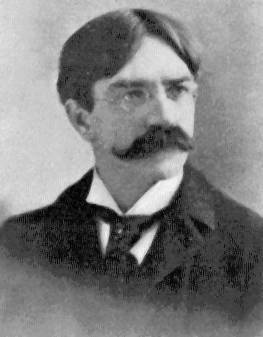The Tide on Tantramar
Charles G.D. Roberts
I
Tantramar! Tantramar!
I see thy cool green plain afar.
Thy dykes where grey sea-grasses are,
Mine eyes behold them yet.
But no the gladness breathed of old
Thy bordering, blue hill-hollows hold;
Thy wind-blown leagues of green unrolled.
Thy flats the red floods fret,
Thy steady-streaming winds--no more
These work the rapture wrought of yore,
When all thy wide bright strength outbore
My soul from fleshly bar.
A darkness as of drifted rain
Is over tide, and dyke, and plain.
The shadow-pall of human pain
Is fallen on Tantramar,
II
A little garden gay with phlox,
Blue corn-flowers, yellow hollyhocks,
Red poppies, pink and purple stocks,
Looks over Tantramar.
Pale yellow drops the road before
The hospitable cottage-door,--
A yellow, upland road, and o'er
The green marsh seeks the low red shore
And winding dykes afar.
Beyond the marsh, and miles away,
The great tides of the tumbling bay
Swing glittering in the golden day,
Swing foaming to and fro;
And nearer, in a nest of green,
A little turbid port is seen,
Where pitch-black fishing-boats careen,
Left when the tide runs low.
The little port is safe and fit.
About its wharf the plover flit,
The grey net-reels loom over it,
With grass about their feet.
In wave and storm it hath no part,
This harbour in the marshes' heart;
Behind its dykes, at peace, apart
It hears the surges beat.
The garden hollyhocks are tall;
They tower above the garden wall,
And see, far down, the port, and all
The creeks, and marshes wide;
But Margery, Margery,
'Tis something further thou wouldst see!
Bid all thy blooms keep watch with thee
Across the outmost tide.
Bid them keep wide their starry eyes
To warn thee should a white sail rise,
Slow climbing up, from alien skies,
The azure round of sea.
He sails beneath a stormy star;
The waves are wild, the Isles afar;
Summer is ripe on Tantramar,
And yet returns not he.
Long, long thine eyes have watched in vain,
Waited in fear, and wept again.
Is it no more than lover's pain
That makes thy heart so wild?
At dreams within the cottage door
The old man's eyes are lingering o'er
The little port,--the far-off shore,--
His dear and only child.
And at her spinning-wheel within
The mother's hands forget to spin.
With loving voice she calls thee in,--
Her dear and only child.
To leave the home-dear hearts to ache
Was not for thee, though thine should break.
For their dear sake, for their dear sake,
Thou wouldst not go with him.
But always wise, and strong, and free,
Is given to which of us to be?--
A gathering shadow, Margery,
Makes all thy daylight dim!
Yet surely soon will break the day
For which thine anxious waitings pray,--
His sails, athwart the yellow bay,
Shall cleave the sky's blue rim.
III
To-night the wind roars in from sea;
The crow clings in the straining tree;
Curlew and crane and bittern flee
The dykes of Tantramar.
To-night athwart an inky sky
A narrowing sun dropped angrily,
Scoring the gloom with dreadful dye,
A bitter and flaming scar.
But ere night falls, across the tide
A close-reefed barque has been descried,
And word goes round the country-side--
"The "Belle" is in the bay!"
And ere the loud night closes down
Upon that light's terrific frown,
Along the dyke, with blowing gown,
She takes her eager way.
Just where his boat will haste to land,
On the open wharf she takes her stand.
Her pale hair blows from out its band.
She does not heed the storm.
Her blinding joy of heart they know
Who so have fared, and waited so.
She heeds not what the winds that blow;
She does not feel the storm.
But fiercer roars the gale. The night
With cloud grows black, with foam gleams white
The creek boils to its utmost height.
The port is seething full.
The gale shouts in the outer waves
Amid a world of gaping graves;
Against the dyke each great surge raves,
Blind battering like a bull.
The dyke! The dyke! The brute sea shakes
The sheltering wall. It breaks,--it breaks!
The sharp salt whips her face, and wakes
The dreamer from her dream.
The great flood lifts. It thunders in.
The broad marsh foams, and sinks. The din
Of waves is where her world has been;--
Is this--is this the dream?
---One moment in that surging hell
The old wharf shook, then cringed and fell.
---Then came a lonely hulk, the "Belle."
And drove athwart the waste.
. . . . . . . . . . . . . . .
They know no light, nor any star,
Those ruined plains of Tantramar.
And where the maid and lover are
They know nor fear nor haste.
IV
After the flood on Tantramar
The fisher-folk flocked in from far.
They stopped the breach; they healed the scar.
Once more the marsh grew green.
But at the marsh's inmost edge,
Where a tall fringe of flag and sedge
Catches climbing hawthorn hedge,
A lonely hulk is seen.
It lies forgotten of all tides,
The grass grows round its bleaching sides,
An endless inland peace abides
About its mouldering age.
But in the cot-door on the height
An old man sits with fading sight,
And memories of one cruel night
Are all his heritage.
And at her spinning-wheel within
The mother's hands forget to spin,--
So weary all her days have been
Since Margery went away.
---Tantramar! Tantramar!
Until that sorrow fades afar,
Thy plains where birds and blossoms are
Laugh not their ancient way!
